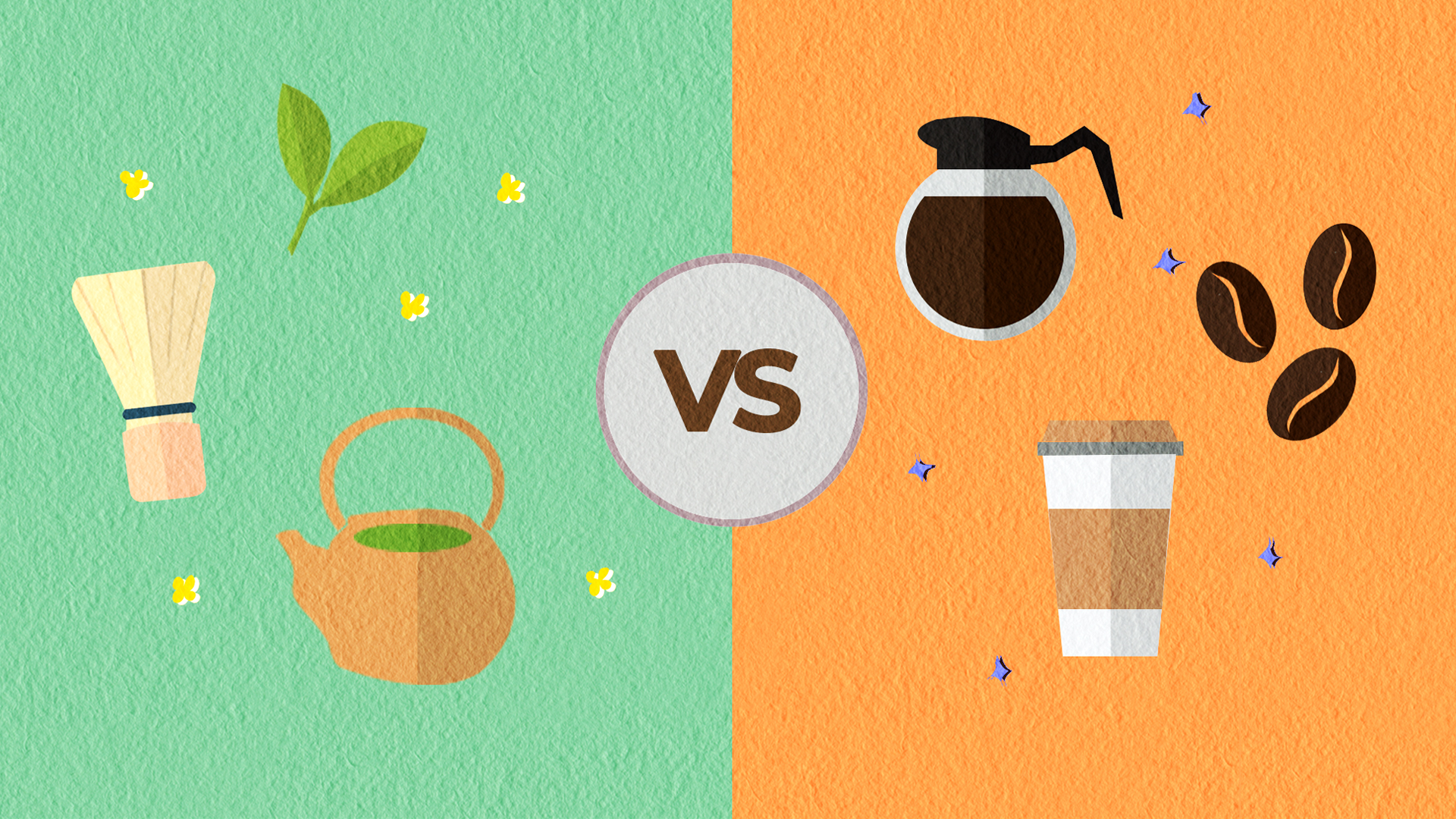For many of us coffee is the energy boost we need to start the day more focused and productive.
Coffee, however, has several drawbacks such as inducing anxiety, poor sleep, and headaches. If you are one of those suffering from these side effects but don't want to quit your morning coffee, then we have good news.
There's a better - and even healthier- alternative to coffee: matcha green tea. Keep reading to learn more about caffeine and about this healthier alternative!
What Caffeine Does to Your Body
Caffeine is a natural compound which is found in the leaves of the tea plant and in the beans of the coffee plant.
Within 30 minutes after we drink a cup of tea or coffee, caffeine is released in our bloodstream and reaches the brain.
Once there, it produces its effects by blocking the activity of a specific chemical, called adenosine, whose role is to make us feel sleepy and weary as we get tired through the day.
As caffeine counteracts the effects of this molecule, we immediately feel focused and energised.
In general, we perceive these effects mostly in the first 2 hours after consumption but they can extend up to 4 hours.
However, the duration and intensity of caffeine effect can differ from person to person as each of us metabolise caffeine in different ways.
How Much Caffeine is in Coffee?
Not all coffees are the same in terms of caffeine content.
Different brewing methods, brewing times, and serving sizes drastically affect the overall caffeine in your cup.
On top of this, the type of cultivated plant from which the beans derive can also play a role. For example, the coffee plant variety Coffee Robusta beans has more caffeine that the Coffee Arabica variety.
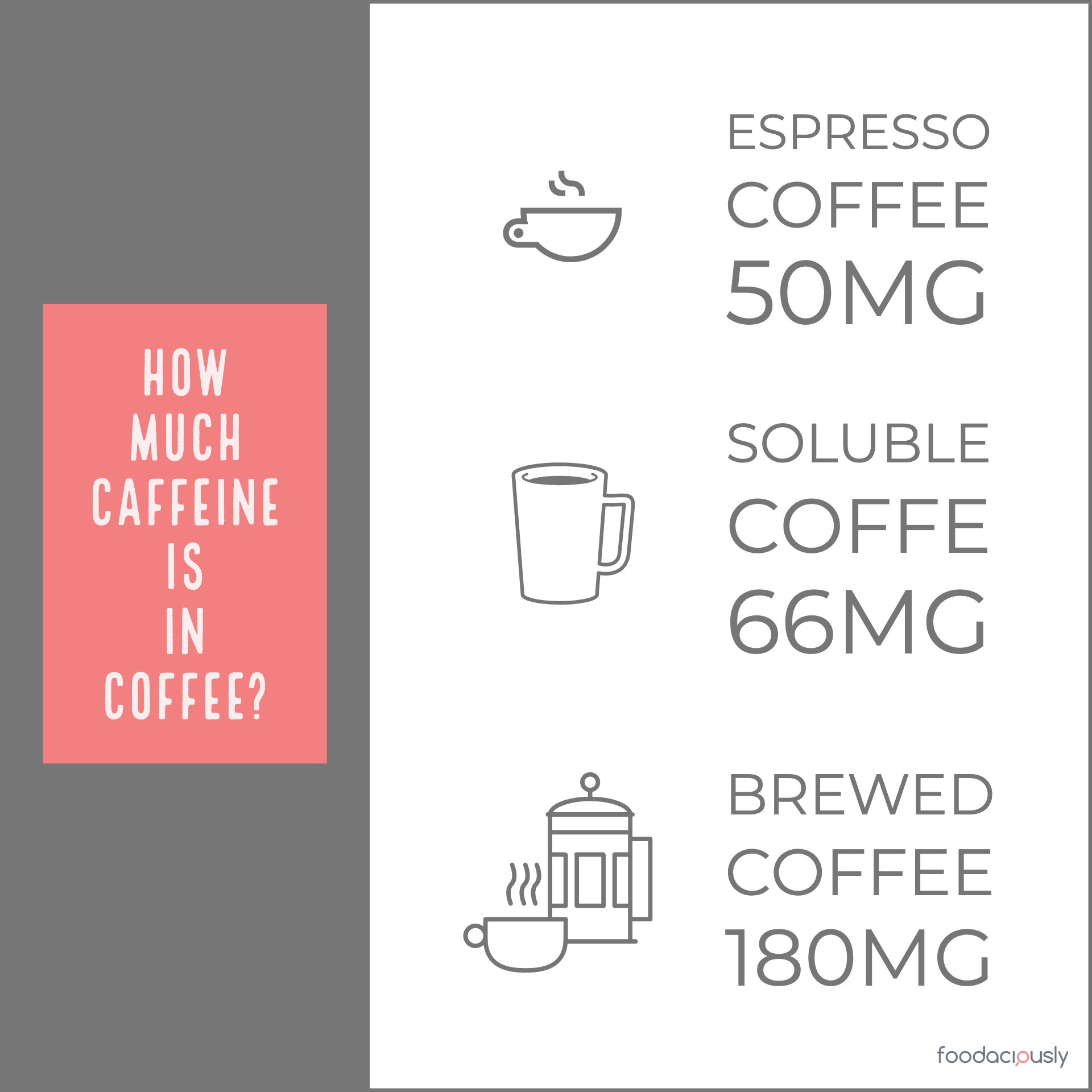
As espresso, brewed coffee, and instant coffee are the most common ways we get to enjoy this drink, let's see how each of them ranks in terms of caffeine content.
Caffeine in Espresso Coffee
Espresso, also known as coffee shot, is the Italian-style coffee which is prepared through a fast pressurised brewing method.
As the caffeine content ranges from 125mg to 210mg in 100ml (3,5oz) of espresso and considering that a regular cup of espresso is just 30ml (1oz) then we can say that it provides 50mg per serving.
Caffeine in Instant Coffee
Instant coffee is made by dissolving a fine powder of ground coffee beans in hot water. The caffeine in soluble coffee can range from 25 mg to 140mg in 100 ml (3,5oz).
A typical serving size of 230ml (8oz) contains an average of 66mg of caffeine.
Caffeine in Brewed Coffee
Brewed coffee is prepared by pouring hot water onto ground coffee beans, then allowing to brew using a filter.
Coffee prepared this way provides from 55mg to 85 mg of caffeine in 100 ml (3,5oz). The serving size is usually 230ml (8oz) which thus provides an average of 185 mg of caffeine per cup.
Amount of Caffeine in Matcha
Matcha tea is the ceremonial green tea in Japanese traditions and has been consumed by Buddhist monks for centuries as a meditation drink.
Matcha is a fine powder of ground whole unoxidised tea leaves and is characterised by a bright green colour, sweet taste and a creamy feel.
In 1 gram of matcha powder there are 35mg of caffeine and matcha green tea is usually prepared with 1 to 2 teaspoons (equivalent to 2g to 4g) of powder gently whisked in a 230ml (8oz) cup of hot water.
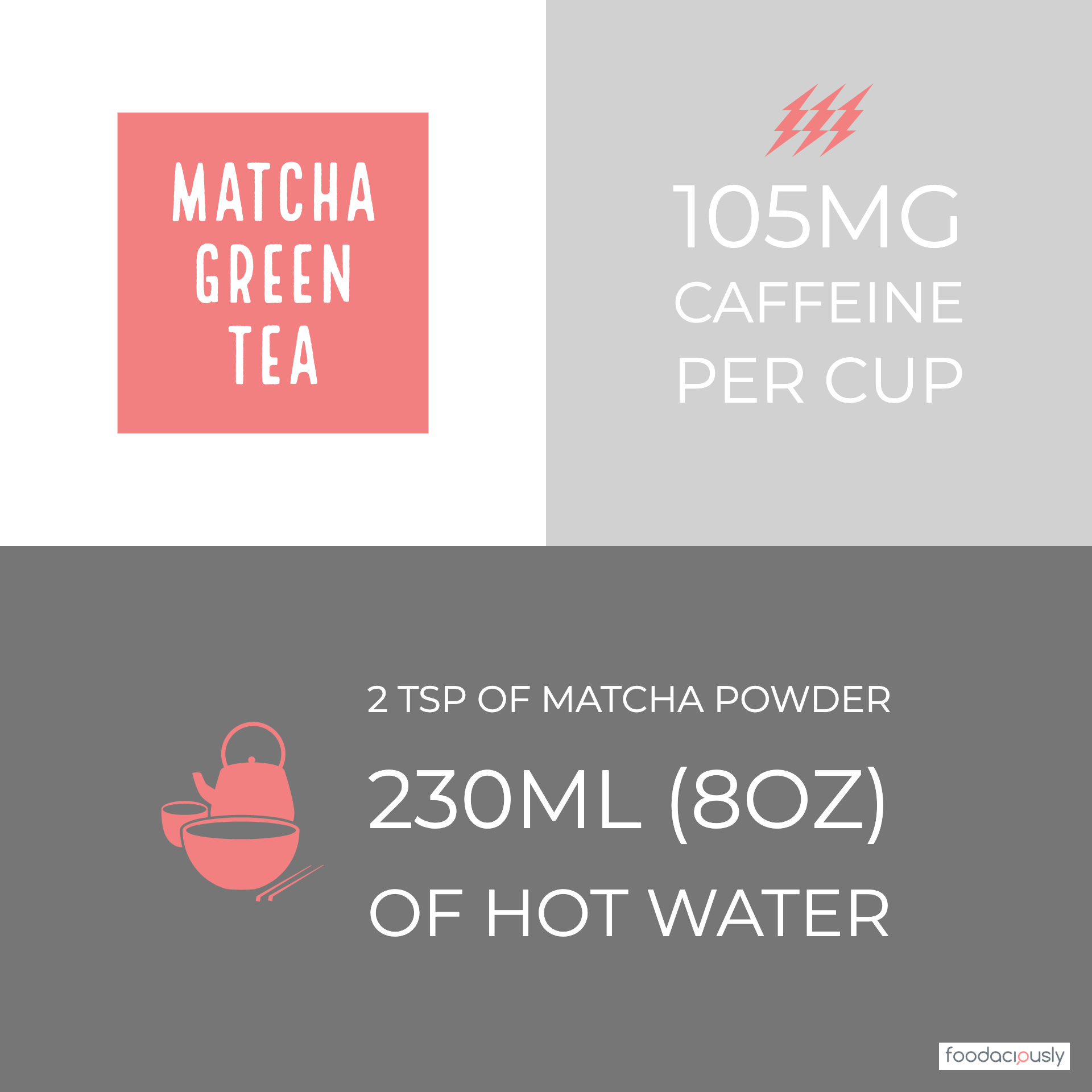
With a bit of math we can see that the caffeine content ranges from 30mg to 60mg in 100 ml (3.5 oz) of prepared tea, which means an average of 105mg per serving.
A cup of matcha tea has more caffeine than espresso and soluble coffee, but less than brewed coffee.
Difference Between Matcha and Green Tea
As both matcha tea and regular green tea are prepared using unoxidised tea leaves, you may think they're the same also in terms of caffeine content, but that is not true. A regular cup of green tea has just 50mg of caffeine, which is half of that of matcha tea.
This two-fold difference is because standard green tea is prepared by a steeping process where the dried leaves are soaked in water and then filtered out, thus limiting the amount of caffeine that actually stays in the cup.
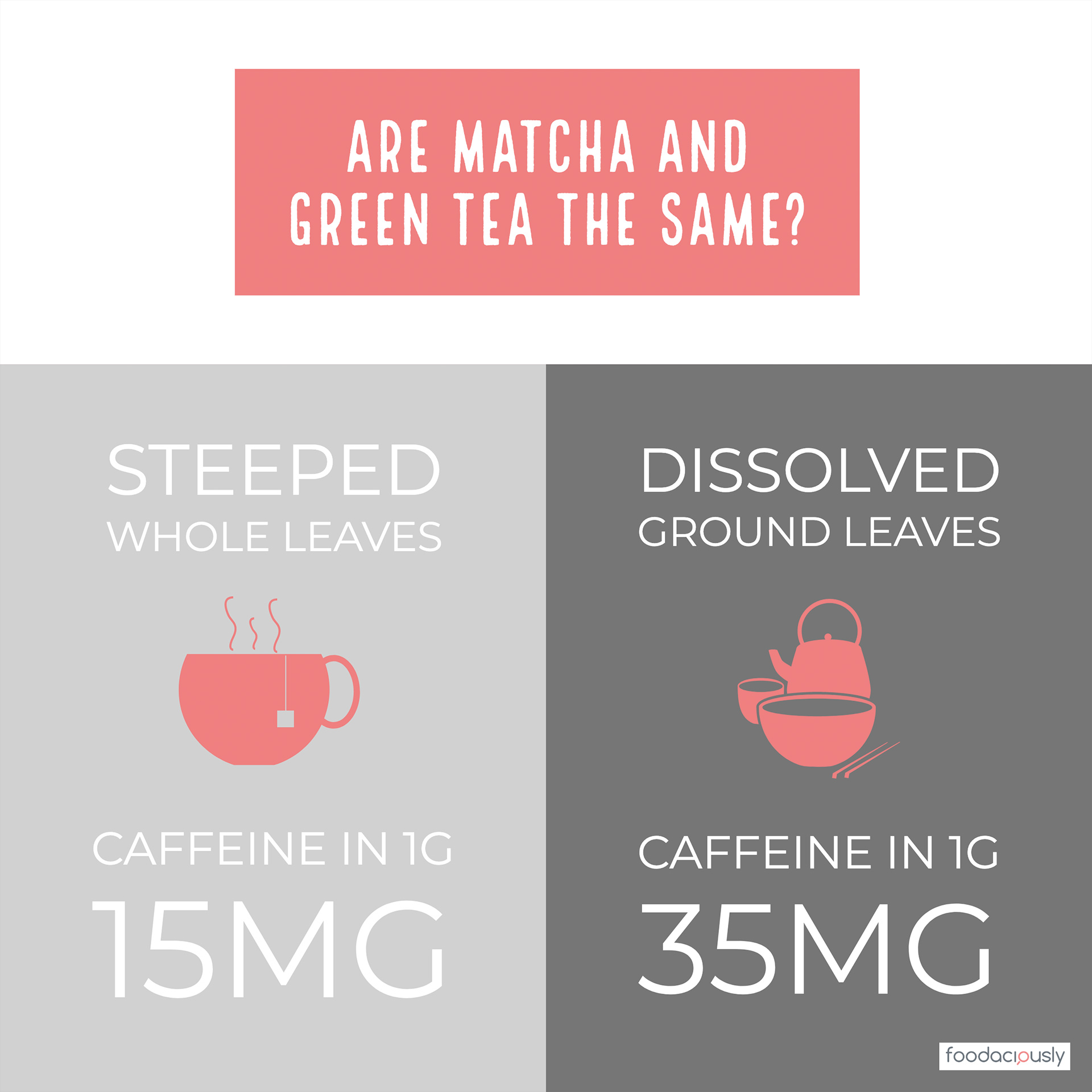
In matcha tea, instead, the entire ground tea leaf is dissolved in water leaving more caffeine and nutrients in your cup.
Is Matcha Better Than Coffee?
The difference between matcha tea and coffee is not only in their caffeine content but also in the way caffeine is assimilated and handled in our system.
Caffeine Effects in Matcha Last for Longer
After you drink a cup of matcha tea, caffeine doesn't reach your blood all at once. Instead, it's slowly released over time and its effects can last up to 8 hours.
This is because caffeine is bound to other chemicals, called catechins, and only after they are broken down and removed, caffeine can freely travel to the brain.
Catechins are specific antioxidants found in tea leaves but not in coffee beans, making this sustained release of caffeine a process unique to matcha green tea.
By preventing a spike in caffeine, catechins in matcha promote a long-lasting boost of energy and they also reduce the side effects typical of coffee consumption like high blood pressure, poor sleep, and migraines.
L-Theanine Promotes Focus and Calm
Beside catechins, L-theanine is another chemical in matcha which plays an essential role in terms of caffeine effects.
L-theanine is an amino acid that is found almost solely in tea plants.
It has a direct effect on the brain where it promotes a state of calm and mental alertness.
This is because L-theanine acts on the brain circuits inducing a specific type of electrical impulses, called alpha waves, which are known to promote relaxation without drowsiness.
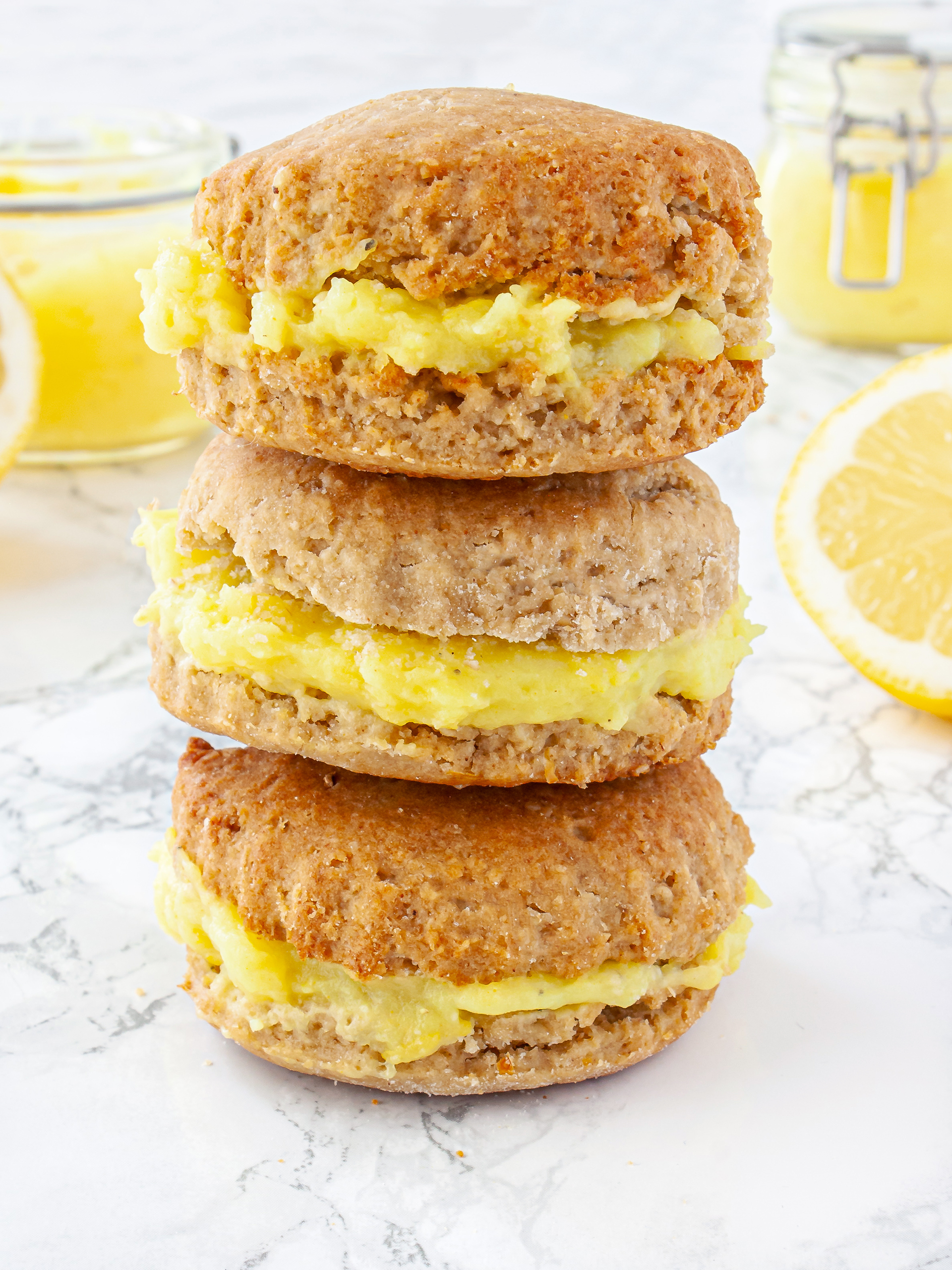
Studies have also demonstrated that L-theanine reduces the body’s response to stress, for example by decreasing the blood pressure and heart rate and affecting other chemicals in the brain involved in dealing with stress, like cortisol.
Matcha green tea is great if you are looking for a calm energy boost without those spikes and jitters that you may experience with coffee.
Synergy for a 'Calm Alertness'
In matcha tea, catechins and L-theanine work in synergy to provide sustained energy whilst offsetting the negative effects of caffeine.
In fact, L-theanine is able to improve mental performance and alertness more than caffeine alone. By exerting a calming effect, it also counteracts the side effects of caffeine, like anxiety and nervousness.
As catechins slow down the release of caffeine, you don't experience a crash of energy - which instead happens a few hours after you drink a cup coffee. Moreover, the increased heart rate and blood pressure typical of coffee are much more subtle.
Matcha is Healthier Than Coffee
Matcha is not only a better choice in terms of quality of caffeine effects, but it also proves to be a healthier choice.
Matcha tea is extremely rich in antioxidants, with a concentration five times higher than that found in coffee.
It ranks with superfoods like Goji and Acai berries which are well know for their antioxidant power.
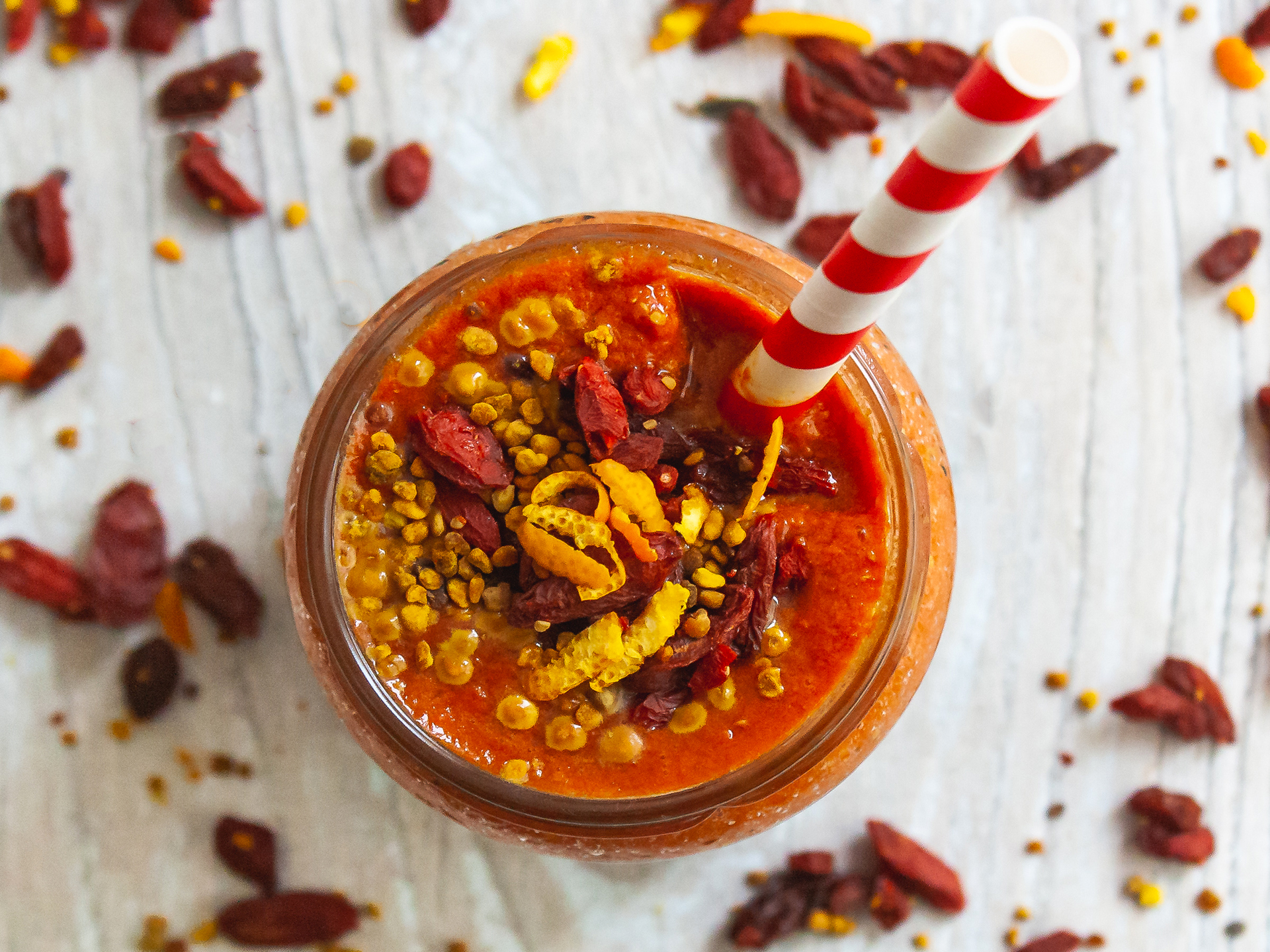
Antioxidants are precious allies for our health as they counteract the cell damage brought by free radicals and linked to many illnesses such as cancer and heart diseases.
Matcha green tea also supports the immune system, reduces bad cholesterol, lowers blood pressure, and boosts metabolism promoting weight loss. All these reasons makes it a remarkable health-boosting drink.
To Sum Up
When it comes to choosing between matcha and coffee, matcha green tea offers a better energy boost in terms of quality and intensity of caffeine effects.
The effects of caffeine from coffee are short-lived and you soon experience its drawbacks. Those from matcha, instead, are balanced by the the properties of catechins and L-theanine.
Matcha tea also provides more health benefits than coffee thanks to its higher concentration of antioxidants, which are linked to improved aging and disease-fighting properties.
REFERENCES
'L-theanine—a unique amino acid of green tea and its relaxation effect in humans', L. K. Juneja, ChiChu, et al, Trends in Food Science and & Technology, 1999
'L-Theanine reduces psychological and physiological stress responses', K. Kimuraa, M. Ozekib, et al, Biological Psychology, 2007, Pages 39-45
'L-Theanine, a Natural Constituent in Tea, and Its Effect on Mental State', Anna C. Nobre, Anling Rao, Gail N Owen, Asia Pacific Journal of Clinical Nutrition, 2008, P167 - 168
'The combined effects of L-theanine and caffeine on cognitive performance and mood', Gail N. Owen, Holly Parnell, Eveline A. De Bruin, 2013, pages 193-198.
'Caffeine Stimulation of Cortisol Secretion Across the Waking Hours in Relation to Caffeine Intake Levels', W. Lovallo et al., Psychosom Med, 2005, 67(5): 734-739
'Determination of catechins in matcha green tea by micellar electrokinetic chromatography' David J. Weiss, Anderton CR, Journal of Chromatography 2003 .
'Medicinal Benefits of Green Tea: Part I. Review of Noncancer Health Benefits', Cooper R., Morré J., The Journal of Alternative and Complementary Medicine VOL. 11, NO.3 , 2005

